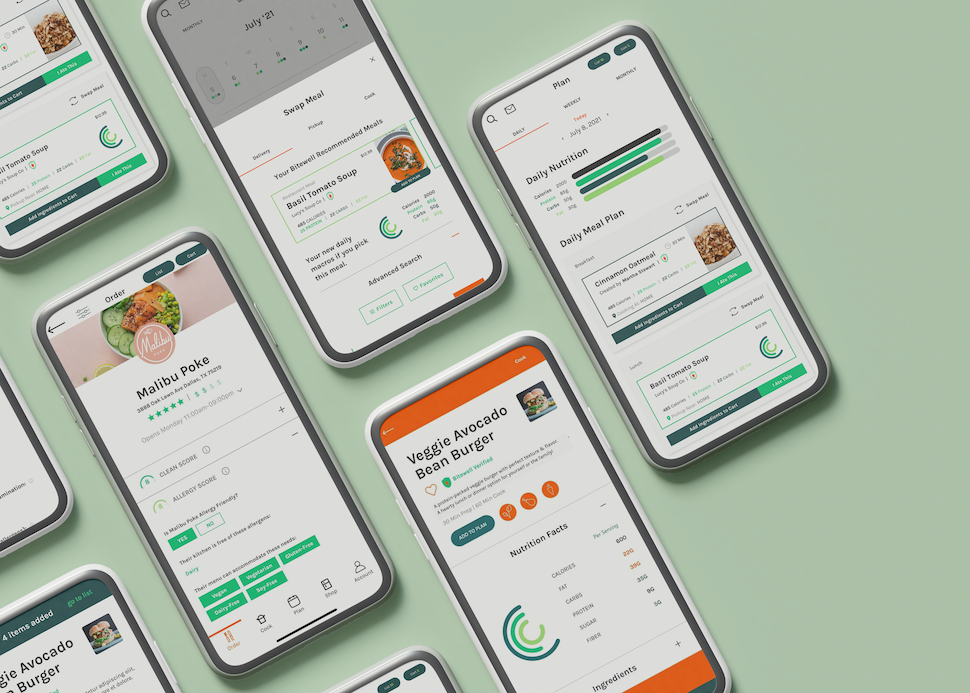When Chris Fanucchi flew around to meet with distributors at his previous startup, he’d find himself in a new city, wondering what to eat besides the defaults of fast food or pizza. A few years later, he met Samantha Citro Alexander, who found herself in similar situations—but with the added difficulty of navigating allergy restrictions.
The result of that meeting is bitewell—a personalized meal planning startup that’s eyeing its launch in Dallas in the next few weeks.
“Our mission as a business is to make healthy eating simple and accessible for all,” co-founder and CMO Citro Alexander told Dallas Innovates. She calls bitewell “a full healthy eating ecosystem.”
Pilot bitewell app now available in Dallas area

[Image: bitewell]
When users download the app—currently open for a pilot phase to users in the Dallas area—they’re onboarded with a quick survey on things like allergies, dietary restrictions, food preferences, and goals. Then, based on their eating habits, the bitewell app connects them with restaurants and recipes that meet their needs.
Offering restaurant menu transparency
On the restaurant side, bitewell has a three-tier model of vetting establishments. At the first tier, bitewell’s algorithm takes publicly available data about a restaurant’s offerings to make informed decisions on its healthiness.
At tier two, a clinician calls up the restaurant, getting information on things like the types of oil used and cross-contamination practices.
Tier three is a formal partnership with the restaurant, where the establishment shares their recipe book with bitewell, so the company can analyze every detail under a non-disclosure agreement. Already, the company has local businesses like Unleavened Fresh Kitchen and Bread Zeppelin on signed up on the third level.
“Our goal is to really support every food decision you make in a day,” Citro Alexander said. “We want to be able to not just provide transparency on all of those things, but we also want to be able to help you track, over time, how those food choices impact how your body feels.”
Citro Alexander said that a third-party partnership will enable food to be ordered for delivery from restaurants. The company also offers up more than 10,000 dietician- and nutritionist-curated recipes, based on users’ preferences, according to bitewell’s website.

Part of the bitewell team, L to R: Paige Hughes, executive assistant; Samantha Citro Alexander, CMO and co-founder;
Whitney Stuart, lead dietician; and Mallory Bobzien, foodie community manager and RD. [Photo: bitewell]
Founder sold his previous brand Limitless to Keurig Dr Pepper
The concept behind bitewell started after Fanucchi sold his previous sparkling water brand Limitless to Plano-based Keurig Dr Pepper in 2020. Before that, Fanucchi had previously founded plant-based drink brand Koia, which can be found on Whole Foods shelves. About a year later, he met with Citro Alexander through a mutual friend at bitewell backer Antler, an early-stage venture capital firm. Before joining the bitewell team, Citro Alexander served as the director of North America consumer engagement and integrated marketing at the Estée Lauder Companies’ brand Smashbox.
“What we uncovered is that half of the data around grocery products and consumer packaged goods is pretty publicly available,” Citro Alexander said. “The other half of the data about what we eat— restaurant and prepared meals—is not available at all. That’s how we ended up here.”
Initially, the company started as an e-commerce platform serving up dietician-curated emerging food and beverage brands directly to consumers—a venture Fanucchi knew well from contacts at his previous ventures. From there, Citro Alexander said the company began testing things like combinations of dietary restrictions, allergens, and ingredient lists that people were looking for, using that data to create today’s iteration of bitewell.
“We built off of that information, and we’re at a much more mature state,” Citro Alexander said.
Looking to launch soon
Already offering data on about 600 restaurants in the Dallas area and more than 10,000 on the back end nationally, bitewell is looking to formally launch in the coming weeks. Citro Alexander sees the Dallas region as an ideal place to start, not only because she’s based here, but also because of its dense restaurant activity and how often residents tend to dine out.
“Dallas is one of the biggest eating out cities,” Citro Alexander said. “It’s a city with lots of people who have been there for a long time and lots of people who are new and flooding through, and are really looking for options, help, and guidance about what and how to eat. All of those things combined made it the perfect city for us to test.”
Seed funding round
In addition to launching its app, Citro Alexander said bitewell is close to closing in on a seed funding round in the next few weeks, though she declined to say how much the company is looking to raise. That money will help bitewell build out its technology and team, with the company looking to double the amount of people working on bitewell to 40 by the end of the year.
The funding will also help bitewell launch in new cities. Citro Alexander said the company aims to launch next in Chicago, where Fanucchi is based, with plans to eventually become an international brand.
“We have to do a few key things,” Citro Alexander said. “We need to continue building out our supply and really connect with every food supply partner possible, so that we’re getting as many options as possible. We also really need to build out demand.”
“We’ll be mostly (focused) in larger cities or larger suburbs, where there’s a critical mass of people,” she added. “But we also want to expand beyond that, so that we’re serving markets that haven’t traditionally been served with healthier food options.”
![]()
Get on the list.
Dallas Innovates, every day.
Sign up to keep your eye on what’s new and next in Dallas-Fort Worth, every day.
































































